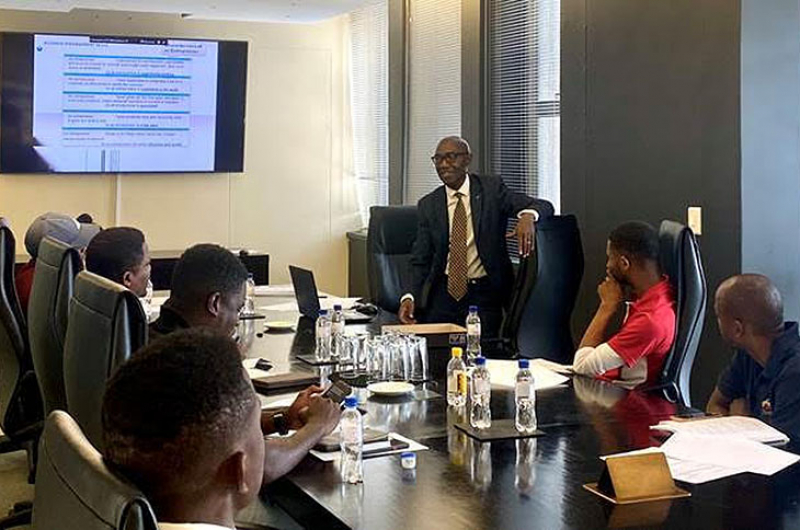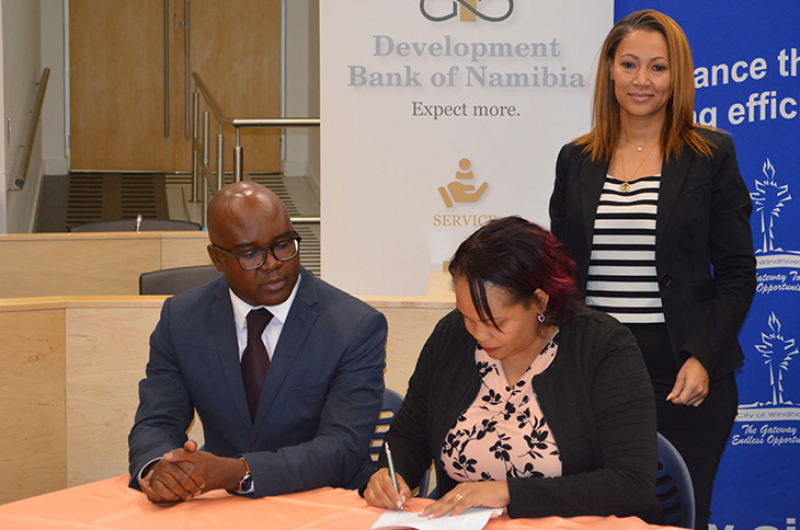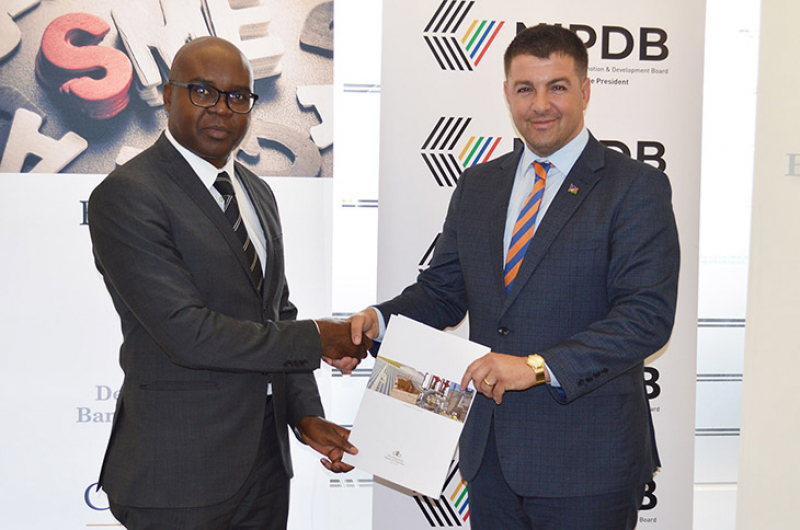 Call 061 290 8000
Call 061 290 8000 Click to mail us
Click to mail us FAQs
FAQs

DBN
The Bank's Mentoring and Coaching Unit has implemented a business management training programme to support young professionals and young artisans financed by the Bank.
- Find out about skills-based finance for young artisans, here...
- Find out about skills-based finance for young professionals, here...
The programme enhances business management skills. Training includes basic business management skills, including business planning, financial planning, costing and pricing, compliance, taxation, procurement, marketing and customer service, human resources, labor relations, and other business topics.
Speaking about the need for training, DBN Head of Marketing and Corporate Communication, Jerome Mutumba said that the young professionals and artisans are highly skilled and trained in their fields, but often lack business skills which places their enterprises in jeopardy. Training programmes are the best way to address the problem.
The training, provided free to the young DBN borrowers, is structured so that the entrepreneurs will not be away from the businesses for too long, and lasts for 6 days, twice a week for 3 weeks. It has been piloted in the Khomas region and will soon be rolled out to the Bank’s Walvis, Ongwediva and Rundu branches.
DBN has announced that it has provided N$155 million in finance for the City of Windhoek’s Khomas substation.
The existing 66kV transmission network that supplies Windhoek is reaching maximum capacity and Nampower’s Van Eck transmission substation has reached its physical and operational margins. Supply capacity to Windhoek is restricted to 160MVA so a 90MVA upgrade is needed to cater for forecasted growth in electricity demand for commerce, industry and households.
According to the Chairperson of the City of Windhoek Management Committee, Cllr. Illse Keister, the proposed Khomas intake substation will ensure additional capacity to support the forecasted demand.
The proposed site of the substation is north of Otjomuise Extension 10. The substation will be developed by the City of Windhoek and Nampower. Nampower will assume the responsibility of constructing and maintaining the substation. City of Windhoek will earn revenue through electricity tariffs from the increased capacity. Part of this revenue will be used to repay the loan to DBN.
The entire substation is valued at N$336 million, of which N$228 million is being contributed by the City of Windhoek. The City has already paid N$72 million from its own resources and the balance will be covered by a DBN long-term loan of N$135 million and a short-term loan of N$20 million to cover VAT.
Speaking about Development Bank’s role as financier, CEO Martin Inkumbi said, the loan will be invaluable in sustaining Windhoek households, commerce and industry for the coming years.
He said DBN has over the past few years financed substantial land and affordable housing development projects in Windhoek, consisting of, among others, finance of N$390.5 million for the Ongos Valley development which will deliver over 4,000 houses in phase one, finance of N$57.8 million for 257 erven in Otjomuise Extension 5, finance of N$107 million to service 274 erven in Rocky Crest, finance of N$76.5 million to service 287 plots in Auasblick Extension 1 and N$31.6 million for 79 houses in Khomasdal Extension 16.
The expected increase in the number of households over the next 5 years will result in increased demand for electricity, which will put pressure on the City's energy supply infrastructure, hence the need to support the expansion of energy generation and distribution infrastructure, Inkumbi concluded.
Development Bank of Namibia (DBN) and the Namibia Investment Promotion Board (NIPDB) have formalized their cooperation with a memorandum of understanding (MoU) signed on 28 September 2022. The two development agencies have previously cooperated in the past, notably when DBN accompanied the NIPDB Know2Grow outreach programme, during which DBN introduced its products to SMEs in 26 towns.
Speaking about the need for cooperation, DBN CEO, Martin Inkumbi, said the Bank is a financing agency that is dependent on demand from potential borrowers. Although DBN promotes its finance and associated services, promotion of economic participation through enterprise activity is the specialist field of NIPDB.
The MoU, which focuses on SMEs, harnesses the capacity of both agencies to further develop the SME sector.
Speaking about the need for inter-agency cooperation, Inkumbi said there are multiple initiatives to develop enterprise, but these initiatives often replicate the work performed by others. This leads to replication of work and potential mixed messages. By combining forces and seeking synergies through cooperating agencies, economic policy can be executed more efficiently.
He cited for example, DBN’s implementation of the Credit Guarantee Scheme (CGS) which provides a collateral guarantee of 60% to SMEs seeking finance from participating commercial banks. He also mentioned a recent agreement with the Namibia Trade Forum (NTF) in terms of which Namibian enterprises will be assisted to further develop their products and services to prepare them for the market.
Dino Ballotti, NIPDB Executive Director responsible for MSME Development, Innovation and Acceleration, said the largest contributors to economic activity in successful economies across the world are Micro, Small and Medium Enterprises, and there is no difference to that of Namibia. MSMEs play a significant role in our financial development, yet they face real challenges in the form of lack of information and financial support.
Evidence demonstrates the scale and commercialization of the sector can be achieved through the development of smart partnerships, such as this one, which will further drive the MSME agenda and ensure that no one is left behind. Access to information and innovative practices that can scale enterprises remains fundamental where the excellent work of the Development Bank will only enhance the efforts of an inclusive, more competitive business environment.
Although Development Bank’s minimum loan amount is N$150,000 for registered enterprises- or N$50,000 for young professionals and artisans, it provides apex microfinance for on-lenders who provide enterprise loans in smaller amounts.





